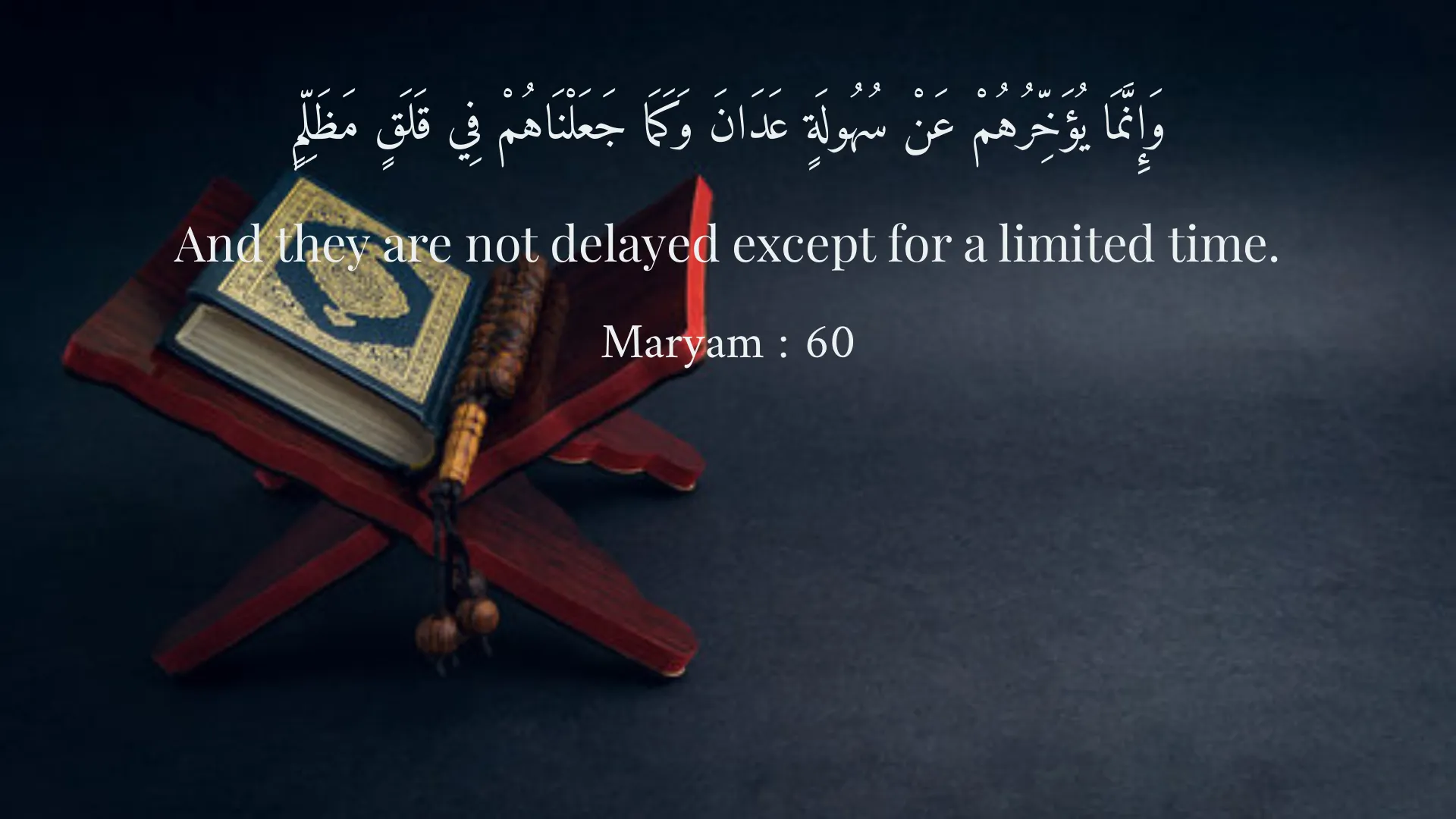Quranic Answer

In the Holy Quran, worship and connection with Allah are considered essential pillars of faith. They form the foundation of a believer’s life and are instrumental in shaping their moral compass, guiding their actions, and providing a sense of purpose and direction. Worship in Islam is not confined to ritualistic acts; rather, it encompasses the entirety of a believer’s actions, thoughts, and intentions. Therefore, any distance from worship can be an indication of underlying personal issues or challenges that an individual may be grappling with in their life. The significance of worship is eloquently reiterated in Surah Maryam, verse 60, where Allah proclaims, 'And they are not delayed except for a limited time.' This powerful verse suggests that the distance from worship might not be a permanent state but rather a temporary hiatus caused by various stressors in daily life. In our fast-paced world, many individuals face overwhelming pressures that can lead them to feel distanced from their spiritual commitments. Competing obligations such as work, family, and societal expectations can consume one’s time and energy, leading to a neglect of the sacred and a subsequent sense of spiritual disconnection. Furthermore, Surah At-Tawbah, verse 108, underscores the importance of internal intention and sincerity by stating, 'Indeed Allah knows what is in their hearts, so keep them in mind and inform them to believe.' This verse serves as a clear reminder that the essence of worship lies primarily within the heart. The intention behind actions, including worship, is what shapes their worth in the eyes of Allah. Thus, when individuals distance themselves from the acts of worship, it is not necessarily indicative of a weak faith. Instead, it often reflects the weight of personal struggles and the pressures of life that they are navigating. For many people, varying life experiences can lead to a feeling of alienation from the realms of spirituality. For instance, the loss of a loved one, unemployment, or health crises can create barriers that hinder a believer’s ability to engage in worship actively. This period of distance may spark feelings of guilt or shame, as individuals might believe that their struggles denote a lack of faith. In reality, it is crucial to view these circumstances through a lens of empathy and compassion. Rather than condemning or criticizing those who distance themselves from worship, it is essential to support them in their journey back towards spiritual fulfillment and healing. Compassionate understanding is particularly vital when dealing with individuals who may be experiencing crises of faith or existential dilemmas. Acts of worship, such as prayer and supplication, can often feel daunting to those in distress. Therefore, loved ones and fellow believers can play a crucial role in creating a nurturing environment that emphasizes understanding, encouragement, and an open dialogue about faith struggles and life challenges. By fostering this supportive atmosphere, individuals may gradually find their way back to their spiritual practices with renewed vigor and devotion. Moreover, engagement in communal worship and activities, such as attending congregational prayers or study circles, can significantly aid individuals in reconnecting with their faith. Such communal engagements often rejuvenate one’s spiritual spirit, reinforcing the idea that they are not alone in their struggles. Community support can serve as a profound source of strength, reminding individuals that they are part of a larger whole, united in shared beliefs and experiences. Furthermore, self-reflection and personal introspection can lead individuals to re-evaluate their relationship with worship and identify barriers that may be causing their distance from it. Engaging with the Quran, revisiting teachings, and contemplating the broader implications of faith can reinvigorate one’s understanding and relationship with Allah. Additionally, seeking knowledge through studying the lives of the prophets, their struggles, and their unwavering devotion to Allah can serve as powerful catalysts for rekindling a robust spirituality. Most importantly, it is essential to approach worship not as a burdensome obligation but as a heartfelt connection with Allah. This connection is characterized by love, gratitude, and reverence, and it is crucial to remember that Allah is compassionate and understands the trials each individual faces. Turning towards Him during challenging times can be an incredible source of solace and strength. By recognizing that life’s pressures can temporarily cause a rift in worship practices, believers can embrace a healthier perspective that acknowledges their struggles, fosters resilience, and allows them to return to their spiritual embrace with a refreshed heart and spirit. In conclusion, the distance from worship is not solely indicative of weak faith but rather a manifestation of life’s multifaceted challenges. Quranic verses emphasize the importance of understanding, compassion, and intention in the realm of faith. Believers should strive to create environments that uplift and support those feeling distanced from worship, reminding them of the inherent compassion in Islam and the never-failing mercy of Allah. By maintaining empathy and encouragement, individuals can journey back to their spiritual peaks, fostering a deeper connection with Allah and a more profound sense of purpose in their lives.
Related Verses
وَإِنَّمَا يُؤَخِّرُهُمْ عَنْ سُهُولَةٍ عَدَانَ وَكَمَا جَعَلْنَاهُمْ فِي قَلَقٍ مَظَلِّمٍ
And they are not delayed except for a limited time.
Maryam : 60
اللَّهُ يَعْلَمُ مَا فِي قُلُوبِهِمْ فَأَحْصُنُوهُمْ وَأَعْلِمُوهُمْ مُؤْمِنَاً
Indeed Allah knows what is in their hearts, so keep them in mind and inform them to believe.
At-Tawbah : 108
Short Story
Sheikh Mahmoud was sitting in a mosque one day when he noticed a young man whom looked downcast. He had been distancing himself from worship, filled with doubts. With kindness, Sheikh said, 'Don't look at your distance from God, but rather at the sleep you’re in, caught in the world's grasp. Always seek to return and ask for forgiveness. God will always embrace you.' The young man felt a wave of peace with these words and decided to return to worship.